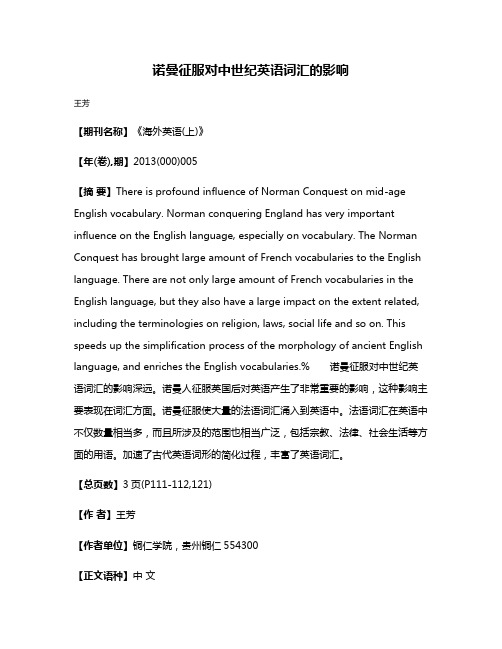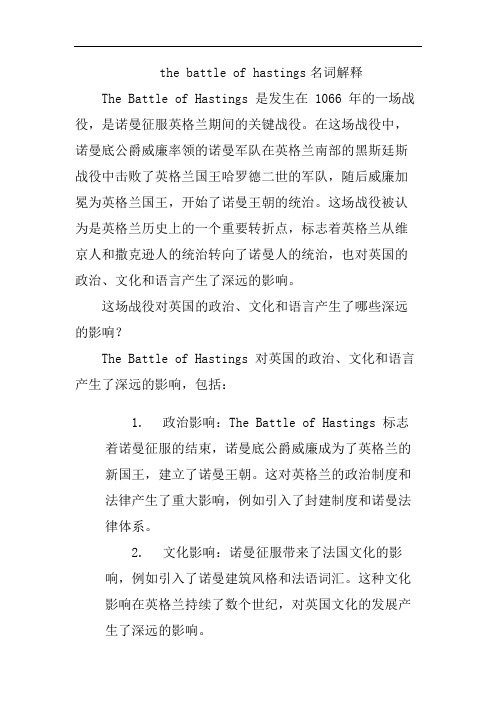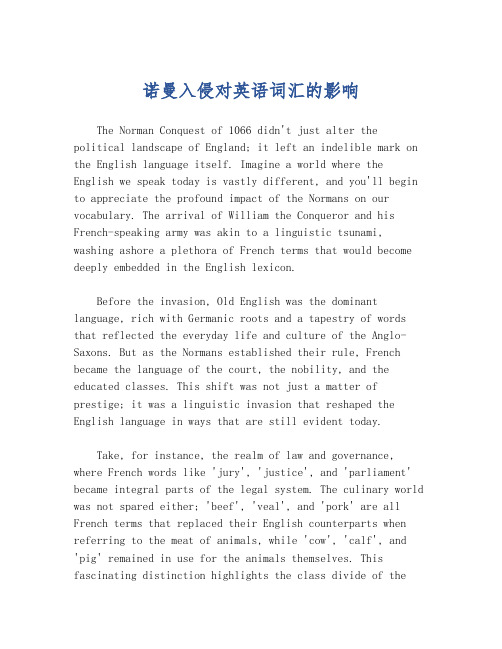浅析诺曼征服对英语语言的影响
诺曼征服对英语语法的影响

诺曼征服对英语语法的影响
诺曼征服对英语语法的影响
诺曼征服指的是1066年诺曼底公爵威廉一世成功征服了英格兰的历史事件。
这次征服对英语语法产生了深远的影响,主要体现在以下几个方面:
1. 词汇影响:诺曼征服后,英语扩充了大量来自法语的词汇。
这些法语借词在英语中广泛使用,使英语词汇更加丰富多样。
在语法上,这些借词导致了名词、动词和形容词等的形态变化。
2. 语法结构改变:诺曼征服后,英语语法受到了法语语法的影响,使得英语的语法结构发生了变化。
例如,从法语中借来的动词形态导致了英语动词的时态和语态的变化。
此外,法语的语序也对英语产生了一定的影响,使得英语语序趋向于主谓宾结构。
3. 名词性别的消失:在诺曼征服之前,英语使用了名词性别,即男性、女性和中性。
然而,随着法语的影响,英语的名词性别逐渐消失,变得更加简化。
现代英语中只有少数名词保留了性别的区分,如actor/actress和prince/princess。
4. 语法规则的简化:诺曼征服后,英语语法结构变得更加简化。
以
前复杂的语法规则逐渐被简化,使得英语学习变得更加容易。
例如,英语的屈折变化逐渐减少,变得更加规则化。
总体而言,诺曼征服对英语语法产生了深远的影响。
通过法语的影响,英语词汇变得更加丰富多样,语法结构发生了变化,名词性别逐渐消失,语法规则变得更加简化。
这些变化使得英语成为了一门更加灵活且易于学习的语言。
了解英法诺曼征服对英语的影响

了解英法诺曼征服对英语的影响诺曼征服对英国的影响深远,甚至加速了英国封建化的进程,那么你还想了解更多吗?下面是由店铺提供的英法诺曼征服对英语的影响,希望能帮助到大家去了解!了解英法诺曼征服对英语的影响现如今人们所说的英语是一零六六年诺曼底征服的直接结果。
现代英语在词汇与语法上都与征服前人们所说的英语有着极大的不同。
为了解这一经过及其原因,应该回顾一零六六年前的英语和诺曼法语,还有受两者相互影响所产生的中世纪英语。
那么诺曼征服对英语的影响到底是怎样的呢,古英语属于西日耳曼语系中屈折变化极多的语支。
该语言中有两种数三种性或者四种形,并残留有对偶数和工具格。
这就使得每个形容词或代词竟有30种屈折变化形式。
其句法仅仅有一部分依赖于词序,动词体系也只有简单的两种时态、三种语气和四种人称,古英语是严格按照发音拼写的。
由于海盗战争和继之而来的操一口古斯堪的纳维亚语的人们的定居,新的词汇已开始传入,语法也已开始简化。
在英格兰北部、中部和东部这些有大批丹麦和挪威人迁入定居的地区,语言的这种变化尤为显著。
虽然说这两种语言的人互相能听懂,但在如今看来,就像是一个苏格兰人与一个伦敦人谈话,谁也不会让步,以上便是简略地对诺曼征服对英语的影响的介绍。
诺曼征服对英语的影响之外,还有对法语的影响,法语中有很多词汇来自高卢人。
高卢人是最初占据法国这片土地的人。
除此之外,法国还经历了多个日耳曼部落的征服和移民,如歌德族以及最后入侵的给这个国家起了新名字的法兰克族,这些人都带来了新的词汇。
了解英法诺曼征服的结果诺曼征服结果就是哈罗德被杀兵败,诺曼人又乘势攻下伦敦,由此开始了诺曼统治时期的英国。
在诺曼以前,英国是贵族民主制,国王和贤人会议共同来管理国家,虽然说国王也会把一些政治权利下放给贵族,但这种现象并不是普遍存在的。
但被诺曼征服之后,国王就成了最高的统治者,他把全国的土地据为已有,然后再分封给各大臣。
那些被加封土地的人再来按照国王的要求来纳税,提供兵役。
从西洋人养cow吃beef谈诺曼人入侵英国对英语词汇的影响

教育教学・Education Teaching192 大陆桥视野・2016年第6期一、引言英语,作为当今世界事实上的国际社交语言,它取得的成功是史无前例的。
众所周知,英语构词灵活,词汇丰富,词汇量大。
究其原因,主要有:国际社会政治经济斗争日趋激烈,由此产生了大量的新词;英美国家国内政治经济斗争不断升级也带来了一定数量的新词;英语语言本身所特有的各种形式的构词法也产生了数量庞大的新词;英语本身无对等词,即从其它语言大量的借词。
不难看出,这些不同原因和手段极大地丰富了英语词汇,使英语成为词汇量最庞大、同义词最丰富、表达力最强和使用影响最广的语言。
本文从英国历史的一个时段出发探讨了诺曼人征服英国对英语词汇的影响,或曰诺曼人征服英国对丰富英语词汇的贡献。
二、诺曼人入侵英国公元1066年,英国发生了一次重大的事件,史称诺曼人入侵英国。
因王位之争,诺曼底公爵威廉率兵五千乘舰队从法国北部入侵英国,在哈斯汀斯战役打败并杀死了英国新王哈罗德。
英国大主教于西敏寺为之加冕,凭着《圣经》将英国交付与之,史称征服者威廉。
胜利的诺曼人几年内不断焚毁村庄,杀戮平民,掠夺英国贵族的土地以犒赏亲属及随从,统治上换成了诺曼人的天下,新贵族取代了盎格鲁撒克逊的老贵族,诺曼法语和诺曼法律成了英国宫廷和贵族的语言和法律。
随着讲法语的诺曼人逐渐成为英国的统治阶级,他们所使用的语言——诺曼法语也完全成了英国政府、教会和学校的官方语言,上流社会都说法语、写法语,英语只为老百姓所用。
说法语的诺曼征服者统治英国达三百余年,引起英国上流社会一片媚法之风。
使用法语成为时髦,甚至连名字都取成法式的了。
法语作为英国的官方语言一直延续至1362年,这一年英国国会第一次正式用英语开会,并且通过了一项英国议会法案,法令规定以后一切法庭诉讼必须用英语进行,英语才恢复了它应有的地位。
但令人不可思议的是,尽管有三百多年的法语统治,英语并未被同化成法语。
讲法语的诺曼人退走后,仅留下了许多原本是法语的词汇,而英语的语法丝毫未被法语化。
诺曼征服对中世纪英语词汇的影响

诺曼征服对中世纪英语词汇的影响王芳【期刊名称】《海外英语(上)》【年(卷),期】2013(000)005【摘要】There is profound influence of Norman Conquest on mid-age English vocabulary. Norman conquering England has very important influence on the English language, especially on vocabulary. The Norman Conquest has brought large amount of French vocabularies to the English language. There are not only large amount of French vocabularies in the English language, but they also have a large impact on the extent related, including the terminologies on religion, laws, social life and so on. This speeds up the simplification process of the morphology of ancient English language, and enriches the English vocabularies.% 诺曼征服对中世纪英语词汇的影响深远。
诺曼人征服英国后对英语产生了非常重要的影响,这种影响主要表现在词汇方面。
诺曼征服使大量的法语词汇涌入到英语中。
法语词汇在英语中不仅数量相当多,而且所涉及的范围也相当广泛,包括宗教、法律、社会生活等方面的用语。
加速了古代英语词形的简化过程,丰富了英语词汇。
战争对英语习语的影响

战争对英语习语的影响本文主要从外族征服和两次世界大战两个方面,讨论了其对英语习语的影响。
标签:英语习语战争起源语言影响习语是语言发展的结晶,是语言使用者长期以来习用的、形式简洁而意思精辟的定型词组或短句。
在英语中,大量的习语都源自重大的历史事件或重大的社会变革。
长期的战争对英语的发展有着重大的影响,留下了深深的烙印。
本文从外族征服和两次世界大战两个方面,讨论了其对英语习语的影响。
一、外族征服1. 罗马人征服公元前55年、54年,凯撒大帝先后两次入侵大不列颠,但并未完全征服当地的凯尔特人,因此,对当时的社会文化没有造成多大的影响。
但在英语习语中,依然留下了凯撒大帝的影子。
“appeal to Caesar”向凯撒诉说,意为诉诸最高权力机构;”Great Caesar”天啊!相当于Great Heavens!“render to Caesar the things that are Caesar’s”凯撒的东西应归凯撒意为:凡事各有所归。
直到公元43年,罗马的另一个大帝,克罗蒂斯,用了三年的时间征服了当时的大不列颠,从此开始了长达300多年的完全统治,直到公元407年,罗马帝国内忧外患之时,才撤军。
在这足以形成一个大不列颠拉丁文化的近400年的时间里,罗马文化和风俗逐渐蔓延渗透,大不列颠人的社会生活,从衣着服饰到陶器器皿,到建筑风格,都开始罗马化,语言也相应地受到了影响。
在今天的英语习语中仍然不难找出古罗马文化的痕迹。
“Do in Roman as the Romans do”在罗马就要过罗马人的生活,意为:入乡随俗;“Rome was not built in a day” 罗马不是一天建成的,意为:伟业非一日之功;”All roads lead to Rome”条条道路通罗马,意为:疏途同归;从这些习语足以可见,罗马的入侵与征服对英语习语的影响之大。
2. 条顿人的征服大约公元449年左右,来自西北欧日耳曼民族的盎格鲁人、撒克逊人、朱特人入侵大不列颠,遭到了当地凯尔特人的顽强抵抗,直到公元6世纪末,岛上的原住民--凯尔特人几乎灭绝,日耳曼人才完全征服这一区域。
the battle of hastings名词解释

the battle of hastings名词解释The Battle of Hastings 是发生在 1066 年的一场战役,是诺曼征服英格兰期间的关键战役。
在这场战役中,诺曼底公爵威廉率领的诺曼军队在英格兰南部的黑斯廷斯战役中击败了英格兰国王哈罗德二世的军队,随后威廉加冕为英格兰国王,开始了诺曼王朝的统治。
这场战役被认为是英格兰历史上的一个重要转折点,标志着英格兰从维京人和撒克逊人的统治转向了诺曼人的统治,也对英国的政治、文化和语言产生了深远的影响。
这场战役对英国的政治、文化和语言产生了哪些深远的影响?
The Battle of Hastings 对英国的政治、文化和语言产生了深远的影响,包括:
1.政治影响:The Battle of Hastings 标志
着诺曼征服的结束,诺曼底公爵威廉成为了英格兰的新国王,建立了诺曼王朝。
这对英格兰的政治制度和法律产生了重大影响,例如引入了封建制度和诺曼法律体系。
2.文化影响:诺曼征服带来了法国文化的影
响,例如引入了诺曼建筑风格和法语词汇。
这种文化影响在英格兰持续了数个世纪,对英国文化的发展产生了深远的影响。
3.语言影响:诺曼征服对英语的发展产生了重
大影响。
在诺曼底公爵威廉的统治下,法语成为了英
格兰的官方语言,对英语的语法、词汇和发音产生了
深远的影响。
英语中的许多法语词汇和发音仍然存在
于现代英语中。
总的来说,The Battle of Hastings 是英格兰历史上的一个重要转折点,对英国的政治、文化和语言产生了深远的影响。
诺曼征服对中古英语中法律词汇的影响

诺曼征服对中古英语中法律词汇的影响摘要】英语是一种世界语言,历史也非常悠久,从古英语到现代英语经历了漫长的演变过程。
而1066年发生的诺曼征服,在英国历史上具有重要意义,它预示着盎格鲁-撒克逊时期的结束和中世纪的开端。
诺曼人征服英国后,法语对英语产生了非常深刻的影响。
这种影响主要表现在词汇方面。
诺曼征服使大量的法语词汇涌入到英语中,据统计,那时有一万多法语单词被引入到英语中,其中75%沿用至今。
现代英语有50%的单词源于法语和拉丁语,其中有一半是在诺曼征服时期借入的。
法语词汇在英语中不仅数量多,而且所涉及范围也相当广泛,本文着重谈及诺曼征服对英语法律词汇的影响。
【关键词】诺曼征服;英语;词汇;法律The Impact on Middle English legal Names of Norman ConquestCaijun(Foreign Department, Zibo Vocational Institute, Zibo 255314, China)【Abstract】English is a kind of world language whose history is also very long. From ancient English to the modern English, it experiences to turn into the process endlessly. The Norman Conquest in 1066 is an important day which indicate the end of theAnglo-Saxon and the beginning of the Middle Ages. After the Norman Conquest of the British People, French has a very deep impact on English. This kind of influence mainly behaves in vocabulary . It makes a large number of French vocabularies poured into English, according to statistics. More than 10,000 French words were introduced in English at that time, 75 percent among them was used till today. There are 50 percent words in Modern English which come from French and Latin language, half of which were in Norman conquest period borrowing . Not only quite a lot of quantity in French vocabulary is in English, but also the range related to is quite extensive. This passage is to have a discussion on the impact of Middle English legal names.【Key words】 Norman Conquest; Middle English;Vocabulary; legal names【中图分类号】H313【文献标识码】B【文章编号】1005-9646(2009)01-0099-01在诺曼征服时期,唯一被西欧所熟知的书面法律形式是罗马法,自公元5世纪西罗马帝国衰落以来,它一直处于低迷状态,然而,在十一世纪晚期十二世纪初,就是这部罗马法使得西欧的人们过上了快乐而有活力的生活,在欧内乌斯(Irnerius)及其后人统治下的意大利北部,特别是在波罗亚大学,更能体现出罗马法盛行这一特征。
诺曼入侵对英语词汇的影响

诺曼入侵对英语词汇的影响The Norman Conquest of 1066 didn't just alter thepolitical landscape of England; it left an indelible mark on the English language itself. Imagine a world where the English we speak today is vastly different, and you'll begin to appreciate the profound impact of the Normans on our vocabulary. The arrival of William the Conqueror and his French-speaking army was akin to a linguistic tsunami, washing ashore a plethora of French terms that would become deeply embedded in the English lexicon.Before the invasion, Old English was the dominant language, rich with Germanic roots and a tapestry of words that reflected the everyday life and culture of the Anglo-Saxons. But as the Normans established their rule, French became the language of the court, the nobility, and the educated classes. This shift was not just a matter of prestige; it was a linguistic invasion that reshaped the English language in ways that are still evident today.Take, for instance, the realm of law and governance, where French words like 'jury', 'justice', and 'parliament' became integral parts of the legal system. The culinary world was not spared either; 'beef', 'veal', and 'pork' are all French terms that replaced their English counterparts when referring to the meat of animals, while 'cow', 'calf', and'pig' remained in use for the animals themselves. This fascinating distinction highlights the class divide of thetime, with the language of the upper classes influencing the way we describe the food on our plates.The influence of the Normans extended to the verystructure of our language. The adoption of French vocabulary enriched English with new expressions and concepts, but italso led to a blending of grammatical structures. The Old English reliance on inflections to indicate case and tense began to give way to a more French-like system, where word order and prepositions took on greater importance.Over time, the fusion of French and English词汇 resultedin the rich, complex language we know today. The Norman invasion was not just a military and political event; it wasa linguistic revolution that forever changed the way we speak, write, and think. The legacy of the Normans is woven into the very fabric of the English language, a testament to the enduring power of words and the cultures that shape them.。
- 1、下载文档前请自行甄别文档内容的完整性,平台不提供额外的编辑、内容补充、找答案等附加服务。
- 2、"仅部分预览"的文档,不可在线预览部分如存在完整性等问题,可反馈申请退款(可完整预览的文档不适用该条件!)。
- 3、如文档侵犯您的权益,请联系客服反馈,我们会尽快为您处理(人工客服工作时间:9:00-18:30)。
The English language that is spoken today is the direct result of 1066 and the Norman Conquest. Modern English is vastly different from that spoken by the English prior to the Conquest, both in its word-hoard and its grammar. In order to understand what happened, and why, it is necessary to look at both English and Norman French before 1066, and then the Middle English that resulted from their interaction.Old EnglishOld English was a highly inflected member of the West Germanic language family. It had two numbers, three genders, four cases, remnants of dual number and instrumental case, which could give up to 30 inflectional forms for every adjective or pronoun. Its syntax was only partially dependent on word order and has a simple two tense, three mood, four person (three singular, one plural) verb system. The spelling of Old English is strictly phonetic.As a result of the Viking wars and the subsequent settlement of many speakers of Old Norse, a North Germanic language, the introduction of new words and a simplification of the grammar had already started to take place. This was more marked in those areas in the North, Midlands and East Anglia where the Danes and Norwegians settled in large numbers. Although the two languages were mutually understandable, a modern day comparison would be a Geordie talking to a Cockney with neither making any concession to the other.The language had four major dialects: Northumbrian, Mercian, West Saxon, and Kentish. As the kings of Wessex (West Saxons) gradually emerged as kings of all England, West Saxon dominated the written form of the language. As such, it gradually became less reflective of the spoken language, especially in the Danelaw.Norman FrenchA legacy of the Roman Empire was the fact that the area west of the Rhine spoke Latin. The Latin they spoke, however, was not the highly inflected Classical Latin, used by the church and scholars, but the common, or Vulgar Latin of the soldiers and the market place. This Vulgar Latin, as it had no one controlling or regulating its use, brought in words from the languages of the local populace. For this reason Italian, Catalan, Spanish, Portuguese and French, though similar, even by 1066 were not the same.French had brought in many words from the Gauls who originally occupied the land. In addition they had suffered conquest and settlement from various Germanic Tribes such as the Goths and Vandals, and finally the Franks, who gave the country its new name. From these peoples came additional words.There were two major divisions in French: langue d'oil in the north; langue d'oc in the south (oil and oc being variations of 'yes'). Langue d'oc was nearer to Catalan than it was to Langue d'oil.Langue d'oil had three major dialects, namely those of Picardy, Ile de Paris and Norman. The Northmen (Danes and some Norwegians) who had taken the land and settled there influenced Norman French. Its proximity to England had also allowed some English words to slip in, noticeably nautical terms.Middle EnglishBy 1100 English had changed sufficiently to be classed as a 'new' version of English, descended from, but quite different to, Old English.Middle English had five major dialects, Northern, West Midland, East Midland, Southwesterm and Kentish. It was characterised by the extreme loss of inflections, almost complete standardisation of the plural to 's' and the introduction of a large number of Norman French and Low German words. The French came, of course, from the French speakers who now controlled the government, the law and the church. The Low German from the large number of Flemish the Normans had first hired as mercenaries and then used to settle those parts of the country they had harried and depopulated.So, how had the changes come about? When the Norse had settled in England they brought with them a language that was from the same linguistic family, and indeed enabled them to be understood by their English neighbours. The culture was also similar, not surprising considering that the original English had come from Scania, Denmark and the North Sea coast bordering Denmark. In addition the new comers supplemented, rather than replaced, both the aristocracy and the commons. As a result assimilation was very quick and easy even before the fighting stopped. The Normans brought with them an alien culture and language. Add to this their social status as the new ruling class, and it is no shock to find that assimilation wasslower, and the new society and language that emerged was so radically changed from that which they found when they arrived uninvited in 1066.English, which had been a written language since the conversion to Christianity, was rapidly dropped as the language for royal and legal charters and proclamations, not reappearing until Simon De Montfort's Parliament issued the Provisions of Oxford in 1258. The replacement language was usually Latin, though often duplicated in French. French was the language of the royal court, the legal system and the church. The use of French was reinforced by the fact that many of the new aristocracy and religious houses had extensive holdings in France. This state of affairs changed slightly in 1204 when King John lost Normandy, but did not really end until after the English were finally expelled from France at the end of the Hundred Years War in 1453.The result of English disappearing as a written language was the removal of any restraints on language development. This assisted the simplification of the grammar as the folk strove to find the simplest way to communicate with people who did not speak English as their first language. The process that had started with the compromises needed to allow English and Norse to understand each other better gathered speed as the Anglo-Scandinavians sought to communicate with both their linguistic cousins, the Flems, and the alien Normans and French. This development was not dissimilar to that of Vulgar Latin as it changed into the various Romance languages as mentioned earlier. By the time the Anglo-Saxon Chronicle stopped being written at its last stronghold in Peterborough in 1154, its West Saxon English was already obsolete.The ruling classes spoke French, as did the many merchants that flocked to England following the Conquest. Those that dealt with them, or had ambitions to join them, had to learn at least some of the language. However, it cannot be assumed that the ruling classes and the merchants did not quickly come to at least understand English if not speak it. It would have been very difficult to oversee an estate or buy and sell unless you could communicate, though it was noted at the time that there was a flourishing job market for translators. This may have sufficed for many of those who arrived with William the Bastard, but surely not for their children, brought up by an English wet nurse and with English servants. It is hard to imagine that those children did not absorb the language at the same time as they supped the milk. It should also be borne in mind that many of the Normans married English wives, often the widows or daughters of the previous English landholder. In such a household both parties would need to learn at least a smattering of the others native language. At a lower level, the need to learn at least simplified English was essential. Many a Norman or Frenchman was granted a holding (which he would re-namea manor) as reward for services rendered during the Conquest. With a totally English workforce and possibly an English wife and no French speakers for miles learning English would have been the number one priority.From documentary evidence we know that by 1160 an English knight had to retain a Norman to teach his son French. Around 1175 a noble woman warns her husband of danger in English, not French as might have been expected. In 1191 one of four knights in a legal dispute cannot speak French when appearing at a court where the proceedings were still conducted in that language. By 1200 phrase books teach French as a foreign language are being produced. In the same year the poet Brut's 'The Owl and the Nightingale' appears and signals the rebirth of English (now Middle English) as a literary language. By the end of the thirteenth century a poet can write:Lewde men cunneFfrensch non,Among an hundrydunneþis on(Lewd [common] men ken[(understand] FrenchnotAmong a hundred onlyone)This Middle English was the basis for the Modern English we speak and write today. The number of words used had expanded greatly, with the French normally supplementing rather than replacing the English, allowing shade of meaning not available to other languages. Thus we can either deem or judge a matter to be right or wrong, with to deem being a personal opinion whilst to judge is a formal declaration. Cattle become beef and swine pork when killed and dressed for the table, yet conversely a flower is a bloom when put on display. Hopefully it will have a pleasant French odour, aroma or scent rather than a Middle English smell or worse, an Old English stench! Also adding to the store of words were French words that had been given and English beginning or ending. For example, the French 'gentle' joins the English man/woman to give gentleman/woman, or gets an English ending to become gently, or even more bedecked with English as ungentlemanly.The habit of using words from other languages rather than creating our own has continued until this day so that it has been claimed that in The Concise Oxford Dictionary there are words from 87 languages, great small,and often dead. The total number of words in Modern English is estimated to be between 400,000 and 600,000, and many of them have more than one meaning! The nearest language in word count is French with a mere (as in 'a restricted amount', rather than a lake) 150,000.Despite this the language is still basically Germanic and most basic words are still derived from Old English. Taking the body as an example, whilst we may have French 'spirit', our body still has English arms, legs, hands, feet, head, eyes, ears, nose and mouth, plus brain, liver, lungs, arse, and men bollocks.Many folk when seeing Old English are totally confused and fail to see the commonality. Much of this is caused by the changes in spelling convention, in addition to the fact that Modern English is not spelt phonetically (with the many different versions of English in use today an impossibility).The Lords prayer is an example:Thu ure Fæder þe eart on heofunum, Sy þin nama gehalgod. Cume þin rice, Sy þinne wille on eorðan swaswa on heofonum. Syle us todaeg urne daeghwamlican hlaf. Ond forgyf us ure gyltas, swaswa we fogyfaþ þampe with u s agyltaþ. Ond ne lae thu na us on constnunge, ac alys us of yfele. Soðlice Phonetically this reads:Thu our Father, thee art on heavenum, say thine nama ge-holyod. Come thine rich, say thine will on earth swas-wa on heavenum. Sell us today ourne day-ge-wham-lick hloaf. And forgive us our guiltas swas-wa we forgiv-ath themp with us a-guilt-ath. And no lay thu nah us on costnun-ya, ahsh all-lays us from evil. Soothlike.Which is quite easy to understand.Another reason we find Old English so hard to understand is that Modern English (as opposed to dialectal English which is still alive, kicking and confusing to this day) is derived from the East Midland dialect of Middle English, rather than from the West Saxon in which most of the original sources is written.Just how English would have developed if there had been no Norman Conquest is a matter of conjecture. No doubt it would have continued the simplification that had started with the arrival of the Norse, but it is doubtful if it would have become the wonderful tool it is today.2.2 中期英语时期(1150-1500)2.2.1诺曼征服与中期英语的产生如果说古英语时期是以盎格鲁—撒克逊入侵不列颠为标志的,那么中期英语时期则是从诺曼人征服盎格鲁—撒克逊人开始的。
